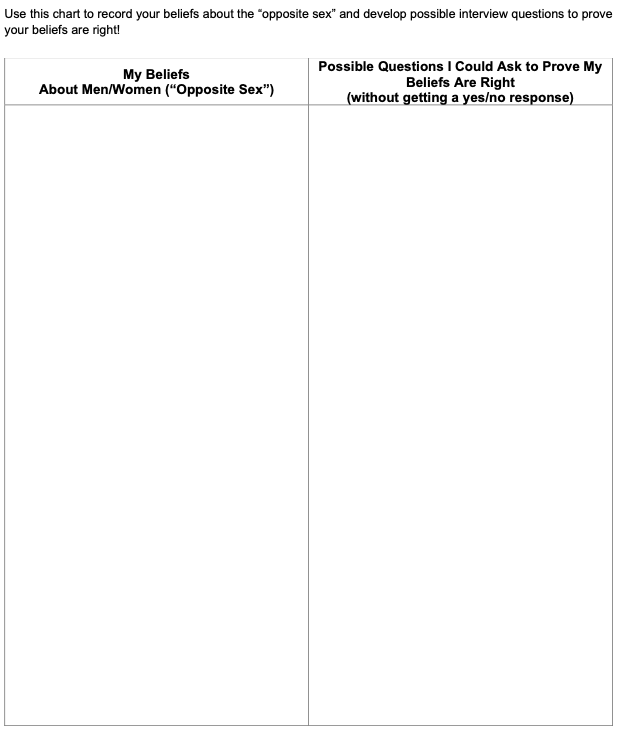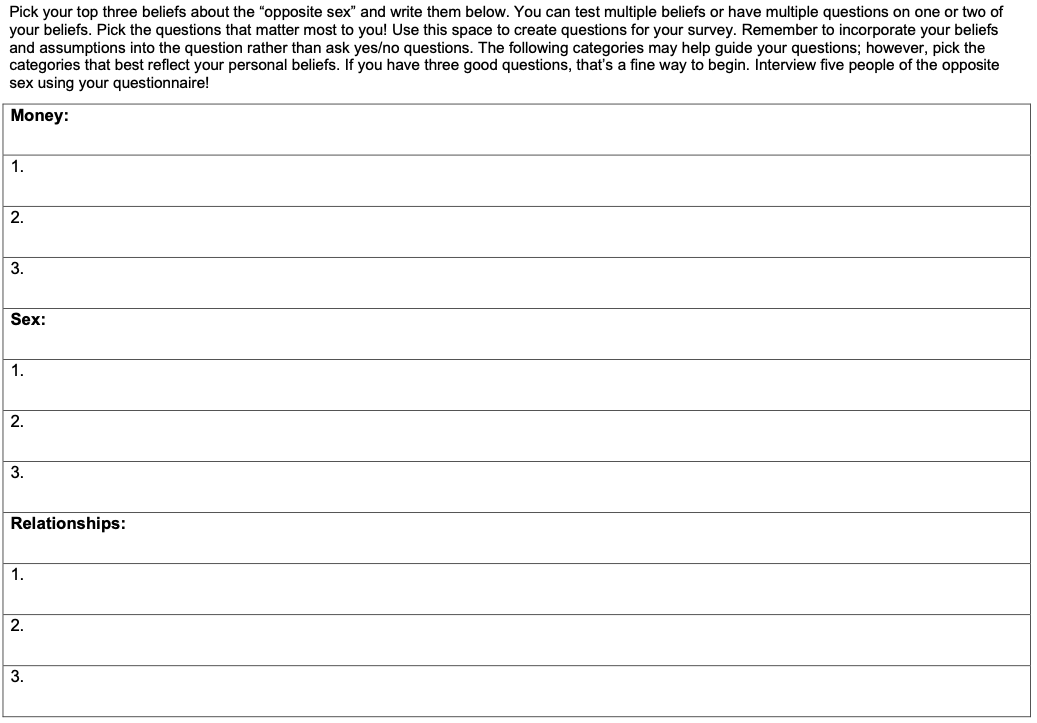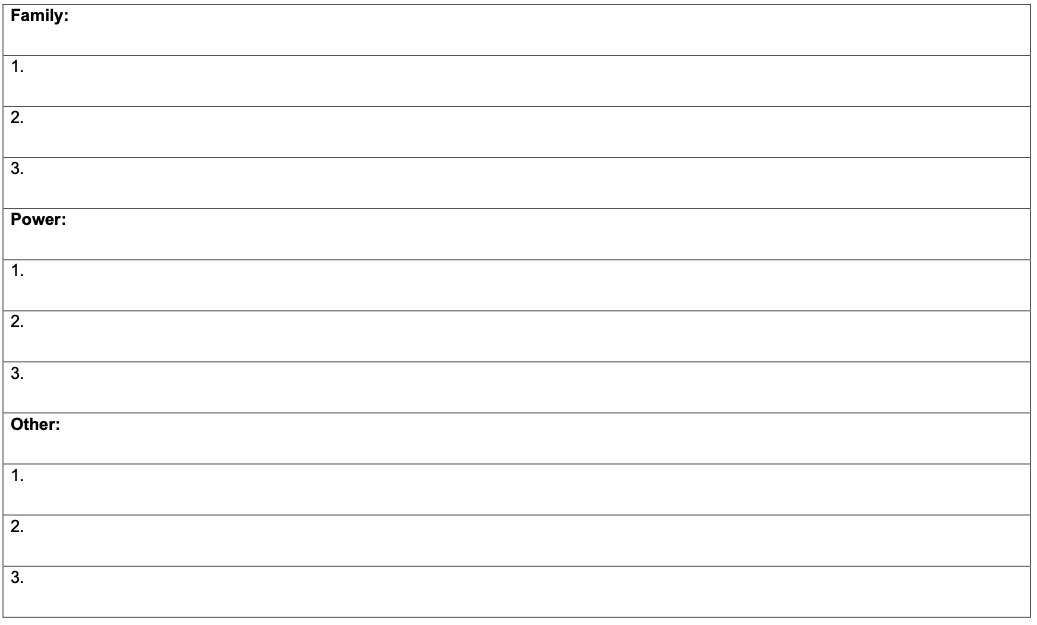THE SURVEY
Test Your Gender Beliefs
One of the biggest blocks to true love and intimacy is our attitudes, beliefs, and suppositions about what has traditionally been called the “opposite sex” (genders different from our own), as well as our own. We view a different gender (or even our own) through the filter of our beliefs based on our early experiences, family and societal programming, and history. Often, our reactions, judgments, and opinions about a different (or the same) sex are projections from our Matrix, not actual, factual reality. Our beliefs, judgments, mindsets, and projections color our perception of others and make it difficult to truly see people for who they really are. And our beliefs often make it difficult for us to be truly ourselves.
Gender biases abound—whether from societal, historical, familial, personal, or other influences. There have been debates, judgments, “jokes”, etc. about the differences between “the sexes” throughout time, not to mention the views about one gender being “better” or “superior.” Even if we aren’t consciously aware of our judgments, we often have unconscious biases toward other genders—which can negatively impact our relationships and capacity for intimacy.
Have you thought about where these beliefs have come from—whether from personal experiences, family stories, or family or societal programming? How much of what you believe or experience is actually transference or projection from your Matrix? Look at your lists again more deeply—what do your lists say about you? What do your lists assume about people with a gender that is different from yours? Have you thought about how your beliefs impact the way you act towards those of a different gender? Towards those of the same sex?
You may have unconsciously operated according to your beliefs about the sexes without assessing their full validity or impact. You may also have used those beliefs to justify your behaviors rather than take responsibility for how you would like things to be. By exploring your beliefs and being willing to bust through your “mythconceptions,” you can experience more satisfaction and fulfillment in your relationships.
This time, you have been embracing insights and tools to create greater intimacy. You may have begun reclaiming projections and transferences. You have been practicing using the Rules of Engagement while embracing the principles of Flow, Aliveness, and Truth. All of these experiences have allowed you to become more aware of the unconscious beliefs and actions that get in the way of real intimacy. This week, we take another step toward that vision by removing barriers in relationship to your ability to partner with the other sex.
By exploring your beliefs, you begin to discover if these beliefs have any truth behind them or what the real truth is. You see if your beliefs are valid when applied to all members of a particular gender identity—men, women, and others. You begin to see how you have created your relationships, and the interactions you have with men and women, through your Matrix and not necessarily through reality. You have the opportunity to confirm or challenge your beliefs about men and/or women. Through this inquiry, you can then decide how you want to continue in relationships with the other gender, and you can create a new way of relating.
This week, you develop a questionnaire to test the validity of your beliefs about the “opposite sex”—gender identities different from your own—and use it to interview some members of that demographic to try to prove that your beliefs are correct!
Our beliefs, judgments, mindsets, and projections color our perception of others and see people for who they make it difficult to truly really are.
Develop Your Questionnaire and Interview People of Another Sex/Gender to “Prove” You’re Right!
Main Assignment
This week’s assignment is to develop and utilize a questionnaire about the “opposite sex.” When we say “opposite sex” in the context of this assignment, we mean any gender identity that is other, or different from your own. Develop questions to try to prove or test your beliefs, and then use your questionnaire to interview five people (or more) of the “opposite sex.” Really test your beliefs—try to prove them true or pick questions that deeply challenge your beliefs. This is your chance to deepen your inquiry and to discover more about your beliefs about the opposite sex and whether they are actually true or not.
Use your questionnaire to identify your potentially unconscious biases. Even the most vehement of us who debate the subject are often blind to our unconscious beliefs. In fact, in the very debate, we are often reacting against an internal part of ourselves of which we are unaware. Keep in mind that this assignment isn’t about being politically correct for now. We want to tease up and expose the more negative, unconscious judgments and beliefs that lurk beneath the surface, not just what we want to believe or think it is right to believe. This is about recognizing our unconsciously held beliefs, most of which are fairly simple, based on man and woman. Do not fall into the trap of interviewing by saying what you think you are supposed to say. Rather, focus on what is true underneath to the best of your ability.
Using your top three beliefs about the “opposite sex” that you harvested in your previous assignment, create questions you could ask that would allow you to have your beliefs challenged or confirmed. It is more helpful to have questions that have your belief in it rather than yes and no answers. For example, if you are attempting to confirm your belief, men could ask women: How do you use your tears to manipulate men? (rather than: Do you cry to manipulate men? Assume that they do and ask them to tell you how they do it.) Women, you could ask men something like: How do you use your anger to intimidate and control women? If you are attempting to challenge your belief, your questions will look very different. Use the worksheet, Beliefs and Questions, to brainstorm possible questions. Get creative!
Pick your top three beliefs about the opposite sex. Consider creating questions about Money, Sex, Relationships, Family, and Power—select the categories that are most related to your core beliefs (see the Gender Questionnaire Worksheet). You can test one, two, or three beliefs. Come up with at least three to five questions for your survey. (You can always ask more questions once you are in the interview.)
Questions other students have asked in the past, based on their beliefs, include:
How do you make men do what you want?
Tell me how you manage to pretend you’re going to please men but you don’t.
How do you manipulate to get women to do what you want? …How do you manipulate women to sleep with you?
Tell me the last time you played one-up and tried to solve women’s problems.
How have you hurt men?
How do you use your anger to control women/men?
How do you get others to take care of you?
Someone who believed that men lied all the time asked, “How have you shaded the truth so far in this interview?”
Discover how you can deepen your awareness of yourself and others, bring understanding and closeness to your relationships and grow from engaging in, rather than avoiding, conflict.
Now go out and “prove” that you are right! Test your beliefs. Go survey the opposite sex and observe and journal about what you find. Interview at least five people of the opposite sex.
Your survey should lead to meaningful conversations with the person you are interviewing—and you should be learning to share with others your beliefs about the opposite sex. Make sure that you are engaging with others about your beliefs about the opposite sex and what you are learning from your assignments.
Very-Able Assignment
Invite People of Different Genders to Your Life Team
How have your beliefs about the “opposite sex” influenced how you invite people to join you on the journey? Consider sharing your discoveries with others when you invite people of different genders to join you and inspire them to explore this in their own life events. Experiment and identify what value this adds to your life team and how you can improve for the better.
Use this opportunity to deepen your yourself, your world, and understanding of others!
Meaningful conversations are the cornerstone of intimacy—
so practice having them this week and keep track of your juicy conversations!
Journal after each interview. Record your thoughts and feelings, any expected or unexpected responses, insights, and new awareness. Notice when you feel that your beliefs are confirmed and when your beliefs are challenged. Express what you are learning about yourself and your beliefs about the opposite sex—and how it has impacted your relationships. Document any new insights these surveys bring up for you around your beliefs in your journal.
This week, learn something from each of your interactions with the “opposite sex.” This can be a truly enlightening experience! Develop great questions to try to “prove” that your not-politically-correct views are right. Challenge others and explore deeply. Really test others. This assignment has been eye-opening—and often heart-opening—for others who have done it. It has generated much more real, honest, conversations and much greater awareness, empathy, and appreciation. Use this opportunity to deepen your understanding of yourself, your world, and others!
Beliefs and Questions
Gender Questionnaire
Questionnaire Responses
Journal After Each Interview
Journal after each interview. Record your thoughts and feelings, any expected or unexpected responses, your insights, and new awareness. Notice when you feel that your beliefs are confirmed and when your beliefs are challenged. Express what you are learning about yourself and your beliefs about the “opposite sex”—and how it has impacted your relationships.






